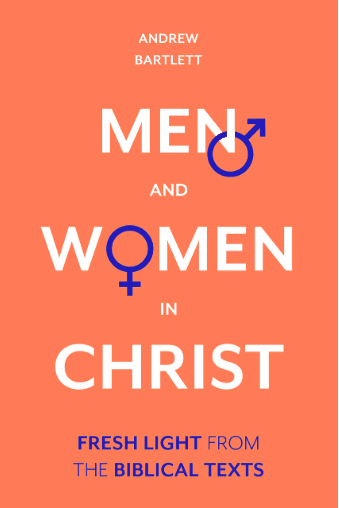 What about the paradigmatic text of all? Genesis? Andrew Bartlett, in his new book Men and Women in Christ (MWiC), explores Genesis 1-3 and beyond.
What about the paradigmatic text of all? Genesis? Andrew Bartlett, in his new book Men and Women in Christ (MWiC), explores Genesis 1-3 and beyond.
I don’t agree with Bartlett on everything but I don’t believe I’ve ever seen a book on such a volatile topic so dispassionately presented.
1. The complementarian interpretation of Genesis 1-3, which argues for male leadership authority, lacks explicit support in the biblical text. It depends on implications which are at best uncertain. None of them is a necessary implication from the text.
2. To be male or female is a created fact of life. The presentation of woman as made to be man’s powerful ally indicates a definite differentiation of men and women.
3- The Genesis text does not define or develop this differentiation. It leaves open the possibility that other scriptures could indicate responsibilities of leadership. But it does not establish male rule. The rule of a man over his wife, as described in Genesis 3:16, is presented as a negative consequence of the fall. This is not something to be deliberately perpetuated or increased.
4. There is no Old Testament text which says that husbands ought to exercise authority over their wives.
5. Scripture is not prescriptive about the balance of roles of husband and wife in caring for the family. The description of the noble wife in Proverbs 31, who is both breadwinner and runs the home, sets out an idealized picture in a particular historical and cultural setting. People’s circumstances, abilities and giftings vary. To regard Proverbs 31 as a mandatory prescription would be to misunderstand it.
6. Teaching about creation cannot provide a definitive answer concerning Christian marriage, because we must go beyond the question ‘How did God order the original creation before the fall?’ and ask also ‘What is God’s purpose for redeemed human beings?’ and ‘In the light of that purpose, how are we to live now?’
7. The institution of marriage in Genesis 2:24 has spiritual significance as pointing forward to the union of Christ and his church (Eph. 5:31). Even if the complementarian interpretation of Genesis 1 – 3 were correct, it would not follow that in Christ the husband should rule the wife. Redemption in Christ is taking believers forward into the new creation, not backwards to before the fall.
8. Old Testament examples of women’s leadership with God’s approval are inconsistent with there being a principle that women may never lead men or exercise authority over them.











